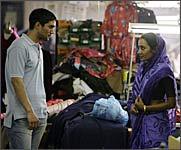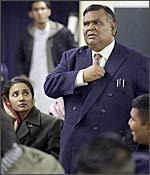Prince Charles, who chickened out of a royal premiere of the controversial film Brick Lane last week, may not know what he missed. But over 300 journalists and trade representatives who watched the film at the Toronto International Film Festival stayed glued till the end.
Journalists (other than those who are reviewing the films) at the film festivals are notorious for walking out of a film in about 20 minutes after it has started if they find it less than compulsively watchable. But that was not the case here. Some were astonished at the high level of performances in the film, especially by Satish Kaushik who plays a Bangladeshi cuckolded husband of a much younger wife.
Sony Pictures Classics which will be distributing the film in America early next year could change the release schedule if it makes a splash in its British release and begin rolling out the film late this year in select American cities.
The film which will soon be shown at the London Film Festival this month, was bought by Sony over two months ago unseen, solely based on the reputation of Monica Ali's novel of the same name. Sony also had watched how Mira Nair's The Namesake slowly but steadily built a reputation across North America grossing about $14 million. In the United Kingdom, though, it grossed just about $1 million, a decent but far from spectacular performance.
 Hollywood insiders believe that Sony would not have gone anywhere near Brick Lane had The Namesake failed to ignite the art-house box-office in America and Canada. The latter film, distributed in North America by Fox Searchlight, grossed $1 million more than Sony's Oscar winning German import The Lives of Others.
Hollywood insiders believe that Sony would not have gone anywhere near Brick Lane had The Namesake failed to ignite the art-house box-office in America and Canada. The latter film, distributed in North America by Fox Searchlight, grossed $1 million more than Sony's Oscar winning German import The Lives of Others.
But will Brick Lane, set in London, do good business in the United Kingdom? The book was a bestseller there, selling half a million copies and a modest success in America. Its publishers have restocked bookshops across North America and Canada with the sticker, 'Now a Major Motion Picture'.
'British audiences are notoriously resistant to films that reflect their multicultural world,' the influential trade publication Screen International which gave the film quite a glowing review wrote recently after its screening at the Toronto fest. 'Kenny Glennan's critically acclaimed Jasmine (2004) failed to even secure a theatrical release domestically,' it added.
The reputation of Ali's novel is the film's biggest commercial asset, the review asserted. It added: 'Stressing a story of impossible love and the charismatic performance of Tannishtha Chatterjee could provide the ingredients that will translate into a modest specialist release'
The trade publication could have added that Jasmine did not have the advantage of being based on a bestselling and controversial novel.
But followed by a number of controversies including the sudden refusal by the Prince to have a royal premiere for the film could push the British distributor to give it a strong release, perhaps taking it to over 60 screens in a month.
The Royal Film Performance of the film was scheduled for October 29. But the impending protests by Bangladeshis in London angry with the story of a Bangladeshi woman who has an adulterous husband in London must have scared the Prince.
 When the shooting started in London more than a year ago, several angry Bangladeshis had driven the production company from Brick Lane to another location. They complained that the book had shown their community in poor light, and they were afraid the movie could show them in a worse light. The same people were apparently getting ready to protest the royal showing.
When the shooting started in London more than a year ago, several angry Bangladeshis had driven the production company from Brick Lane to another location. They complained that the book had shown their community in poor light, and they were afraid the movie could show them in a worse light. The same people were apparently getting ready to protest the royal showing.
Though Clarence House (the office of Charles) says that the special performance was dropped because of a scheduling conflict, the London newspapers and the trade publication Variety think the performance was cancelled for political reasons.
'The cancellation of the Royal Film Performance is a real shame,' said first-time director Sarah Gavron in a statement. Though Ali hasn't spoken out as yet, she had said earlier that the film, like the book, is not sensational and exploitative, and the husband (played brilliantly by Satish Kaushik) goes through a kind of redemption in the end.
Gavron added: 'The clear message from audiences once they have seen the film is that it is absolutely not disrespectful or controversial in any way. None of those elements cited by the minority of protestors during the production period appear in the film.'
Meanwhile, Charles is being criticised royally, even by Parminder Vir, an advisor on the film who collected an OBE from Prince Charles in 2002 (for her services to broadcasting and film).
'It is very sad that the film was announced and then withdrawn just a few days later because someone at Clarence House, or wherever, had seen the film and fears that it will damage the Royal Family in some way,' Vir told the Sunday Telegraph.
She added: 'This plays into the hands of people who want us to live in fear of immigration and Islam. Showing this film would not damage anyone. It is not a film about race but about one woman's struggle in a new country. She just happens to be a Muslim from Bangladesh.'